五升六英语讲义
- 格式:doc
- 大小:782.00 KB
- 文档页数:7
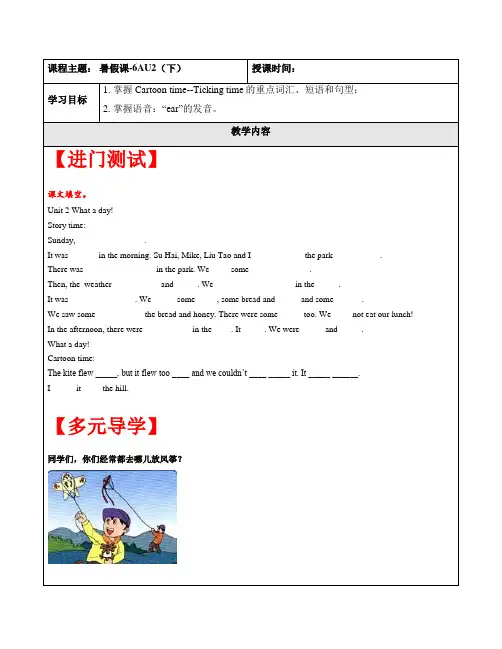
【进门测试】课文填空。
Unit 2 What a day!Story time:Sunday, _____ __________.It was ______ in the morning. Su Hai, Mike, Liu Tao and I _____ ______ the park _____ _____.There was _____ _____ _____ in the park. We ____ some ______ _______.Then, the weather _____ _____ and _____. We _____ ______ ______ in the _____.It was ____ _____ _____. We _____ some ____ , some bread and _____ and some ______.We saw some _____ _____ the bread and honey. There were some _____ too. We ____ not eat our lunch! In the afternoon, there were _____ _____ in the ____. It _____. We were _____ and _____.What a day!Cartoon time:The kite flew _____, but it flew too ____ and we couldn’t ____ _____ it. It _____ ______.I _____ it ____ the hill.【多元导学】同学们,你们经常都去哪儿放风筝?21.There w________ a lot of honey and cakes in the classroom yesterday. 22.There was a fashion s________ in the theatre.23.It was hot yesterday. We w__________s__________ in the river.五、看图完成句子24.It’s a __________ day.25.It’s a __________ day.26.It’s a __________ day.27.It is a ________ day.六、语音/词汇判断判断每线单词划线部分发音是否相同,若相同写(T),不相同写(F)。
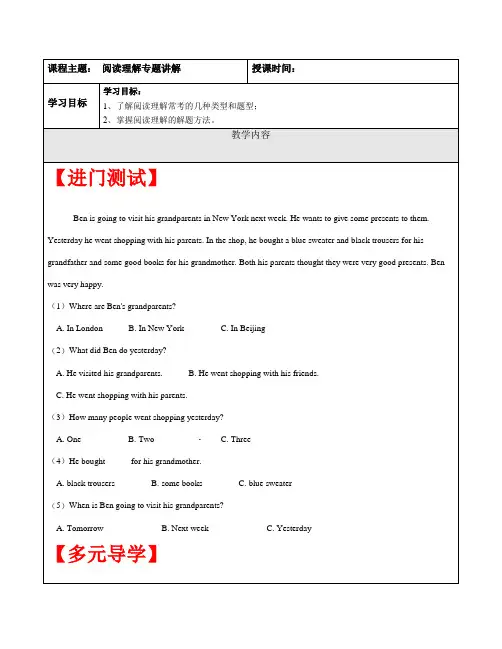
【进门测试】Ben is going to visit his grandparents in New York next week. He wants to give some presents to them. Yesterday he went shopping with his parents. In the shop, he bought a blue sweater and black trousers for his grandfather and some good books for his grandmother. Both his parents thought they were very good presents. Ben was very happy.(1)Where are Ben's grandparents?A. In LondonB. In New YorkC. In Beijing(2)What did Ben do yesterday?A. He visited his grandparents.B. He went shopping with his friends.C. He went shopping with his parents.(3)How many people went shopping yesterday?A. OneB. TwoC. Three(4)He bought _____ for his grandmother.A. black trousersB. some booksC. blue sweater(5)When is Ben going to visit his grandparents?A. TomorrowB. Next weekC. Yesterday【多元导学】1、如何用英文表示“剪刀石头布”?2、我们用石头剪刀布来决定吧,如何用英文表达?【互动精讲】阅读理解阅读理解是英语中词汇、句式、语法的综合运用,是一个比较综合的题目,对所掌握的英语技能的程度要求比较高;既要重视对英语基础知识的掌握,又要养成阅读的好习惯,加强练习。
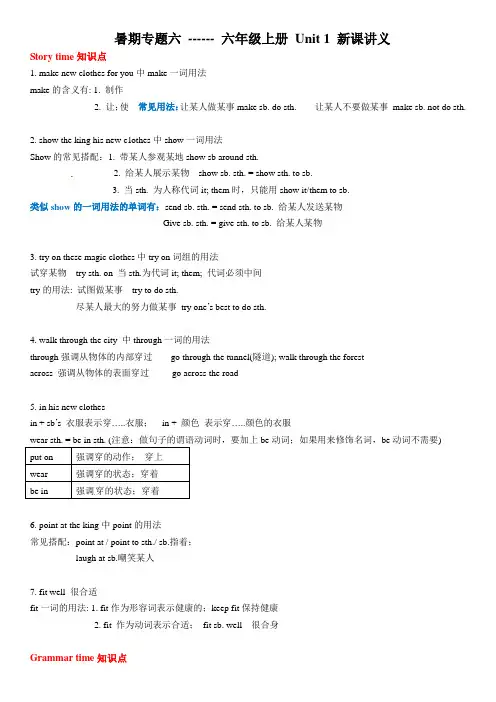
暑期专题六------ 六年级上册Unit 1 新课讲义Story time知识点1. make new clothes for you中make一词用法make的含义有: 1. 制作2. 让;使常见用法:让某人做某事make sb. do sth. 让某人不要做某事make sb. not do sth.2. show the king his new c lothes中show一词用法Show的常见搭配:1. 带某人参观某地show sb around sth.2. 给某人展示某物show sb. sth. = show sth. to sb.3. 当sth. 为人称代词it; them时,只能用show it/them to sb.类似show的一词用法的单词有:send sb. sth. = send sth. to sb. 给某人发送某物Give sb. sth. = give sth. to sb. 给某人某物3. try on these magic clothes中try on词组的用法试穿某物try sth. on 当sth.为代词it; them; 代词必须中间try的用法: 试图做某事try to do sth.尽某人最大的努力做某事try one’s best to do sth.4. walk through the city 中through一词的用法through强调从物体的内部穿过go through the tunnel(隧道); walk through the forestacross 强调从物体的表面穿过go across the road5. in his new clothesin + sb’s 衣服表示穿…..衣服;in + 颜色表示穿…..颜色的衣服wear sth. = be in sth. (注意:做句子的谓语动词时,要加上be动词;如果用来修饰名词,be动词不需要)put on 强调穿的动作;穿上wear 强调穿的状态;穿着be in 强调穿的状态;穿着6. point at the king中point的用法常见搭配:point at / point to sth./ sb.指着;laugh at sb.嘲笑某人7. fit well 很合适fit一词的用法: 1. fit作为形容词表示健康的;keep fit保持健康2. fit 作为动词表示合适;fit sb. well 很合身Grammar time知识点一般过去时:基本概念:一般过去时表示①过去某个时间里发生的动作或状态;②过去习惯性. 经常性的动作. 行为。
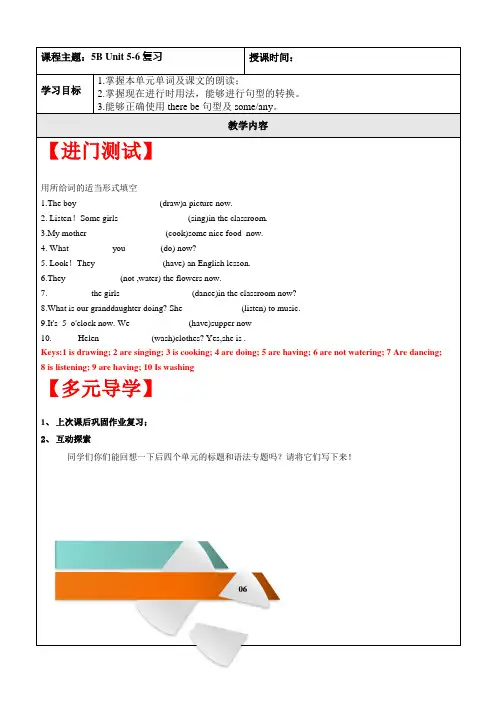
课程主题:5B Unit 5-6复习授课时间:学习目标1.掌握本单元单词及课文的朗读;2.掌握现在进行时用法,能够进行句型的转换。
3.能够正确使用there be句型及some/any。
教学内容【进门测试】用所给词的适当形式填空1.The boy __________________ (draw)a picture now.2. Listen!Some girls _______________ (sing)in the classroom.3.My mother _________________ (cook)some nice food now.4. What _________ you _______ (do) now?5. Look!They _______________(have) an English lesson.6.They ____________(not ,water) the flowers now.7.__________the girls ________________(dance)in the classroom now?8.What is our granddaughter doing? She _____________(listen) to music.9.It's 5 o'clock now. We _____________(have)supper now10.______Helen____________(wash)clothes? Yes,she is .Keys:1 is drawing; 2 are singing; 3 is cooking; 4 are doing; 5 are having; 6 are not watering; 7 Are dancing;8 is listening; 9 are having; 10 Is washing【多元导学】1、上次课后巩固作业复习;2、互动探索同学们你们能回想一下后四个单元的标题和语法专题吗?请将它们写下来!050641.cook cooking cooking【要点回顾】现在进行时的句式结构肯定句:主语+ be +动词ing+其它e.g. He is running now.否定句:主语+ be + not +动词ing+其它e.g.He is not running now.一般疑问句:Be +主语+动词ing+其它e.g.Are you listening to music now?特殊疑问句:疑问词+ be +主语+动词ing? e.g.What are you doing at two?但疑问词当主语时其结构为:疑问词+be+动词ing? e.g.Look! Who is singing under the tree? 【温故知新】一、单选题1.My sister ______ a bike in the park. ()A.like ride B.like riding C.likes riding2.—What are you looking ______ in the kitchen? ()—Potatoes.A.of B.in C.for3.There ______ some milk on the table. ()A.is B.are C.am4.—What are you doing, Miss Li? ()—I ______ an English book.A.is reading B.reading C.am reading5.The dog can’t ______ because its legs hurt. ()A.run B.running C.runs6.---Look! Mr Yang is cleaning the car.()。
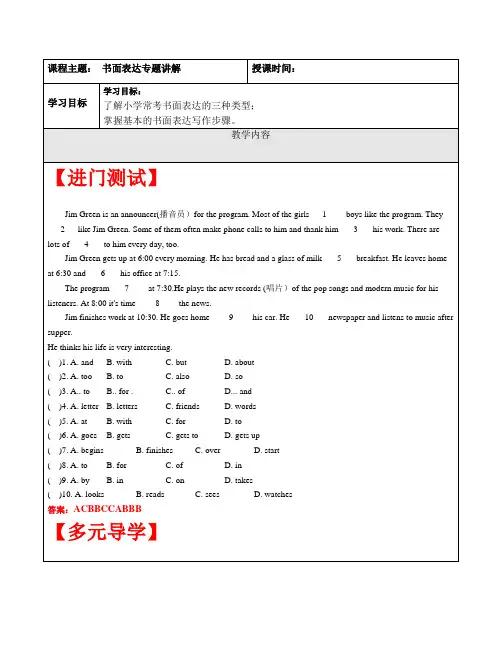
【互动精讲】【知识梳理1】书面表达的三种类型一般来说,小学作文题型分为三大类,话题写作,看图写作以及根据提示写作。
【巩固练习】1.话题写作:同学们,在去年春节你都做了哪些事情?想一想,请以‘Last Spring Festival’为题,给我们介绍一下吧!(不少于八句话)__________________________________________________________________________________ __________________________________________________________________________________ __________________________________________________________________________________ __________________________________________________________________________________ __________________________________________________________________________________ ____________________________________________________________答案:Last Spring Festival, I went to visit my grandparents. I had a wonderful time there. I helped my grandmother do a lot of housework and watched TV with my grandfather. In the evening, my grandmother cooked lots of nice food for me. And they also gave me red packets. I was very happy. My parents bought me some presents. After that, we watched fireworks together.2.看图作文。
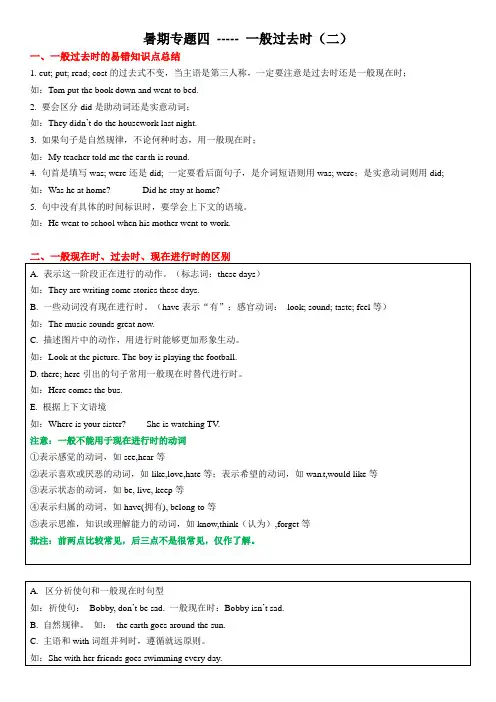
暑期专题四----- 一般过去时(二)一、一般过去时的易错知识点总结1. cut; put; read; cost的过去式不变,当主语是第三人称,一定要注意是过去时还是一般现在时;如:Tom put the book down and went to bed.2. 要会区分did是助动词还是实意动词;如:They didn’t do the housework last night.3. 如果句子是自然规律,不论何种时态,用一般现在时;如:My teacher told me the ear th is round.4. 句首是填写was; were还是did; 一定要看后面句子,是介词短语则用was; were;是实意动词则用did; 如:Was he at home? Did he stay at home?5. 句中没有具体的时间标识时,要学会上下文的语境。
如:He went to school when his mother went to work.A. 表示这一阶段正在进行的动作。
(标志词:these days)如:They are writing some stories these days.B. 一些动词没有现在进行时。
(have表示“有”;感官动词:look; sound; taste; feel等)如:The music sounds great now.C. 描述图片中的动作,用进行时能够更加形象生动。
如:Look at the picture. The boy is playing the football.D. there; here引出的句子常用一般现在时替代进行时。
如:Here comes the bus.E. 根据上下文语境如:Where is your sister? --- She is watching TV.注意:一般不能用于现在进行时的动词①表示感觉的动词,如see,hear等②表示喜欢或厌恶的动词,如like,love,hate等;表示希望的动词,如wan t,would like等③表示状态的动词,如be, live, keep等④表示归属的动词,如have(拥有), belong to等⑤表示思维,知识或理解能力的动词,如know,think(认为),forget等批注:前两点比较常见,后三点不是很常见,仅作了解。
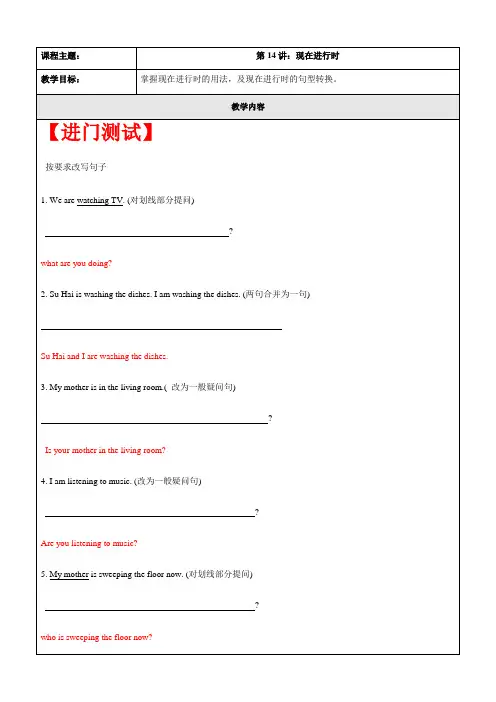
【多元导学】Hey!What are you doing ?嘿!干啥呢?【互动精讲】批注:知识点精讲与练习。
建议时间为60分钟。
现在进行时【知识梳理1】现在进行时的结构和用法I. 现在进行时用来表示现在正在进行或发生的动作。
时间状语为:now, Look! Listen! these days, 时刻(it’s two o’clock)结构为:be动词+动词现在分词II. ★动词加ing的变化规则1. 一般情况下,直接加ing,如:cook-cooking2. 以不发音的e结尾,去e加ing,如:make-making, taste-tasting3. 如果末尾是一个元音字母和一个辅音字母,双写末尾的辅音字母,再加ing,如:run-running,stop-stopping注:小学范围内这类动词主要有:put---putting; sit---sitting; swim—swimming; run---running; stop---stopping; get---getting; begin—beginning; jogging【例题精讲】例1.写出下列动词的现在分词:【巩固练习】根据中文意思完成句子:1. --学生们在干什么?--有一些在打电话,另一些躺在沙滩上。
-- the students ?-- Some on the phone, and others on the beach.2.--“格林先生在看电视吗?” --“不,他在打扫房间。
”--“Mr Green TV?” --“, He the house.”3. 魏芳不是在读书,她在写信。
Wei Fang a book. She a letter.4. 我正在通过收音机学(learn) 英语。
I English on the radio.5. 这个老人每天早上六点钟起床。
The old man at six o’clock in the morning every day.6. 你从哪里来?Where you from?或Where you from?我从美国来。
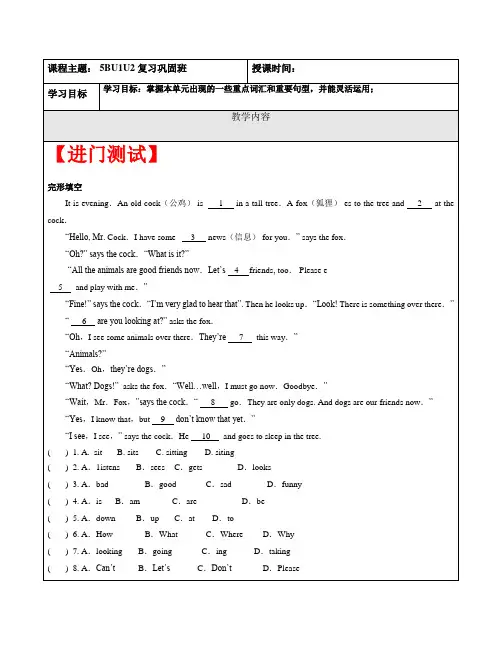
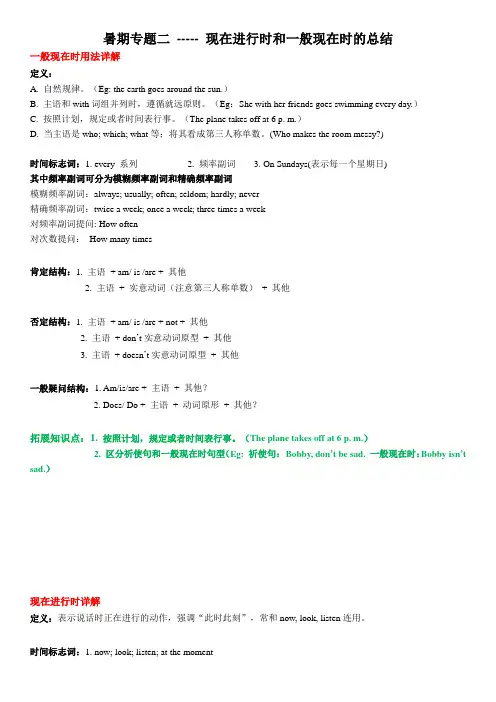
暑期专题二----- 现在进行时和一般现在时的总结一般现在时用法详解定义:A. 自然规律。
(Eg: the earth goes around the sun.)B. 主语和with词组并列时,遵循就远原则。
(Eg:She with her friends goes swimming every day.)C. 按照计划,规定或者时间表行事。
(The plane takes off at 6 p. m.)D. 当主语是who; which; what等;将其看成第三人称单数。
(Who makes the room messy?)时间标志词:1. every 系列 2. 频率副词 3. On Sundays(表示每一个星期日)其中频率副词可分为模糊频率副词和精确频率副词模糊频率副词:always; usually; often; seldom; hardly; never精确频率副词:twice a week; once a week; three times a week对频率副词提问: How often对次数提问:How many times肯定结构:1. 主语+ am/ is /are + 其他2. 主语+ 实意动词(注意第三人称单数)+ 其他否定结构:1. 主语+ am/ is /are + not + 其他2. 主语+ don’t实意动词原型+ 其他3. 主语+ doesn’t实意动词原型+ 其他一般疑问结构:1. Am/is/are + 主语+ 其他?2. Does/ Do + 主语+ 动词原形+ 其他?拓展知识点:1. 按照计划,规定或者时间表行事。
(The plane takes off at 6 p. m.)2. 区分祈使句和一般现在时句型(Eg: 祈使句:Bobby, don’t be sad. 一般现在时:Bobby isn’t sad.)现在进行时详解定义:表示说话时正在进行的动作,强调“此时此刻”,常和now, look, listen连用。
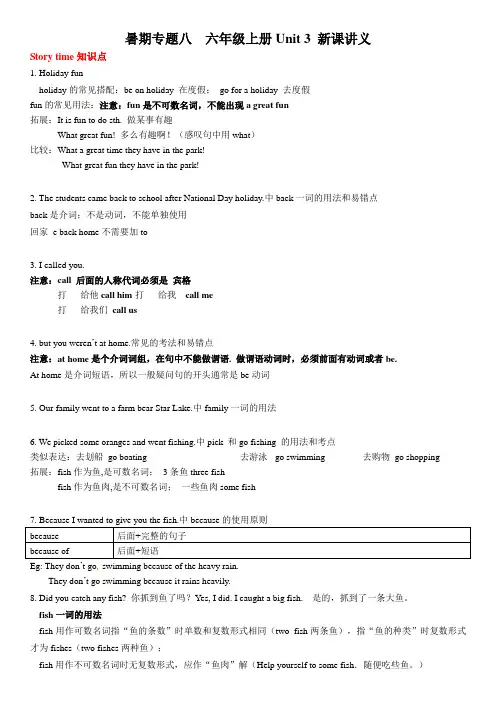
暑期专题八六年级上册Unit 3 新课讲义Story time知识点1. Holiday funholiday的常见搭配:be on holiday 在度假;go for a holiday 去度假fun的常见用法:注意:fun是不可数名词,不能出现a great fun拓展:It is fun to do sth. 做某事有趣What great fun! 多么有趣啊!(感叹句中用what)比较:What a great time they have in the park!What great fun they have in the park!2. The students came back to school after National Day holiday.中back一词的用法和易错点back是介词;不是动词,不能单独使用回家 e back home不需要加to3. I called you.注意:call 后面的人称代词必须是宾格打给他call him打给我call me打给我们call us4. but you weren’t at home.常见的考法和易错点注意:at home是个介词词组,在句中不能做谓语. 做谓语动词时,必须前面有动词或者be.At home是介词短语,所以一般疑问句的开头通常是be动词5. Our family went to a farm bear Star Lake.中family一词的用法6. We picked some oranges and went fishing.中pick 和go fishing 的用法和考点类似表达:去划船go boating 去游泳 go swimming 去购物go shopping拓展:fish作为鱼,是可数名词;3条鱼three fishfish作为鱼肉,是不可数名词;一些鱼肉some fish7. Because I wanted to give you the fish.中because的使用原则because 后面+完整的句子because of 后面+短语Eg: They don’t go swimming because of the heavy rain.They don’t go swimming because it rains heavily.8. Did you catch any fish? 你抓到鱼了吗?Yes, I did. I caught a big fish. 是的,抓到了一条大鱼。
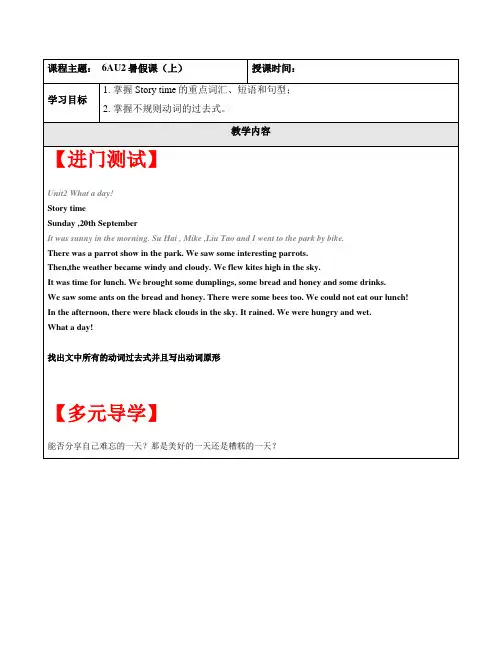
教学建议:让学生分享自己难忘的一天,介绍一天中发生的事情,可以是美好的一天,也可以是糟糕的一天。
引入本节课What a day! “糟糕的一天!”的主题。
【互动精讲】知识点1:U2单词学习1.sunny晴朗的2.show展览,展示3.interesting有趣的,有意思的4.weather 天气5.become变成,变为6.windy有风的7.cloudy多云的8.high在高处9.sky天空10.bring带来11.honey蜂蜜12.drink饮料13.ant蚂蚁14.bee蜜蜂15.cloud 云16.rain下雨11.The New Year’s Day is coming. Let’s _______ together. () A.cheered B.cheers C.cheer 12.I often go to the park _______ bus _______ my friends. () A.on; with B.by; and C.by; with 13.It’s time _______ dinner now. ()A.for have B.to have C.have 14.It _______ yesterday afternoon. ()A.rained B.rain C.rains四、选词/短语填空look sad wind and cloud play football hold onto meetone's friend15.Lily often _____ in the street. They’re happy to see each other. 16.Look! Joe _____ his book now.17.It’s _____ today. Let’s go out to fly the kite.18.—Jenny _____ now. What happened?—She couldn’t find her school bag.19.The boys _____ in the playground yesterday afternoon.五、句图匹配选择正确的句子与图片进行搭配。
暑期专题一----- 感叹句what/how以及How引导的特殊疑问句一、由"what"引导的感叹句用法:"what"意为"多么"用作定语,修饰名词(被强调部分),单数可数名词前要加不定冠词a/an,复数可数名词或不可数名词前不用冠词。
结构:A. what + (a/an) + adj. + n. + 主语+ 谓语! What a clever girl she is! 多么聪明的姑娘呀!B. what + adj.+ n.复数+ 主语+ 谓语! What interesting stories they are! 多么有趣的故事呀!C. what + adj.+ n.不可数+ 主语+ 谓语! What good news it is! 多么好的消息!二、由"how"引导的感叹句用法:"how"意为"多么",用作状语,修饰形容词或副词(被强调部分)。
如果修饰形容词,则句中的谓语动词用系动词; 如果how修饰副词,则句中的谓语动词用行为动词。
结构:How + adj.(adv.) + 主语+ 谓语!. How cold it is today! 今天多么冷呀!三、陈述句变感叹句口诀:一断,二去,三加,四换位,五感叹号。
一断:即在谓语动词后断开,使句子分为两部分。
如:He is / a very clever man .二去:即去掉very, too, much, quite等修饰语。
如:He is / a clever man .三加:即第二部分若是副词、形容词,就加上how;若是一个名词,就加上what。
如:He is / what a clever man .四换位:即将断开的第一部分和第二部分位置互换。
如:What a clever man he is .五感叹号:即句子末尾别忘了加上感叹号。
【进门测试】按要求完成句子。
(每题1分,共5分)1.Jim would like to see a new film. (同义句)Jim __________to see a new film.2.Helen should listen to the teachers in class.(改为否定句)Helen ____________listen to the teachers in class.3.His brother goes to work by bus.(对划线部分提问)___________does his brother ___________ to work?4.help, Yang Ling, the, asks, policeman ,for (.)______________________________________________________1.wants2.shouldn’t3.How go4.Yang Ling asks the policeman for help.【多元导学】当天气晴朗的时候,你们一般喜欢做什么?当下雨的时候,你们又喜欢做什么呢?答案:walk through the city;go through the forest;The river runs through our town.复习:方位介词【知识梳理5】多漂亮的衣服啊!这句为感叹句,感叹句是英语的一种句型,用来表示人的强烈感情。
一般来说,感叹句是由“what”和”how”开头的,句末用感叹号,朗读时为降调。
答案:What beautiful clothes!Unit2 重难点解析【知识梳理1】晴朗的【形容词】【名词】有风的【形容词】【名词】多云的【形容词】【名词】多雨的【形容词】【名词】【动词】【巩固练习】1.It was in the afternoon, but now it is .下午天气还是多云的,但是现在晴朗了。
【进门测试】1.找出下列单词中不同类的那一个。
( )1.A.hand B.handbag C.schoolbag D.box ( )2.A.snow B.rain C.wind D.sunny ( )3.A.manager B.farmer C.work D.nurse ( )4.A.season B.winter C.spring D.autumn ( )5.A.year B.month C.day D.May ( )6.A.onion B.peas C.cabbage D.healthy ( )7.A.foot B.head C.leg D.book ( )8.A.basketball B.party C.soccer D.ping-pong 【多元导学】你知道什么是名词么?是表示具体或者抽象事物/人物的词。
【互动精讲】【知识梳理】考点一名词的分类名词是表示人或事物名称的词,它分为普通名词和专有名词两大类。
普通名词又分为可数名词和不可数名词。
可数名词包括个体名词和集体名词,有单数和复数之分;不可数名词包括物质名词和抽象名词,没有复数形式。
词条用法例词普通名词可数名词个体名词表示个体的人或事物的词book,desk,table,bike,plane集体名词表示一群人或一些事物的词family,class,police,team, group不可数名词物质名词表示构成各种物体的物质或材料的词glass,water,air,paper,wood抽象名词表示状态、品质、行为、感情等抽象概念的词danger,health,love,success, interest专有名词表示人、地方、事物、机构、组织等名称的词Alice,Canada,the Great Wall 考点二名词的数名词分为可数名词和不可数名词:1)不可数名词27.The w_______ on the bus go round and round.28.That man is my _________ (父亲).29.C______ start at 8 o’clock in the morning.30.Cinderella ____________________ (穿上) the new__________ (衣服) and new shoes.四、按要求填空将下列单词的复数形式改成单数形式。
暑期专题三一般过去时(一)【概念】1.一般过去时表示过去某个时间里发生的动作或状态;(1) We visited a farm last Sunday.(2) They were students ten years ago.2.一般过去时表示还可以表示过去习惯性、经常性的动作和行为。
They often went to the park on Sundays last year.【时间标志】1. yesterday系列; yesterday morning/afternoon;the day be fore yesterday2. ago系列; three days/weeks/months/years ago3. last系列; in 2008/20194. in+过去年份; last night/week/Sunday/term/year5.其他; just now(刚才);the other day (前几天)【动词过去式的变化规则和不规则变化】A. 规则变化1. 一般情况下, 直接+ ed; playplayed; workworked2. 以不发音e结尾的词, 直接+ d; dancedanced; useused3. 辅音加y结尾的词, 改y为i + ed; studystudied; trytried4. 重读闭音节的词, 双写尾字母+ ed. stopstopped; planplannedB. 不规则变化(需要单独记忆)【基本结构和句式】1. Be型(1)肯定句:主语+ was / were +其他He was at home yesterday.(2)否定句:主语+ was / were + n ot + 其他He was not at home yesterday.(3)一般疑问句:Was / Were +主语+其他Was he at home yesterday?(4)特殊疑问句:特殊疑问词+ was / were +主语+其他Where was he yesterday?2. Do型(1)肯定句:主语+ did +其他I watched TV last night.(2)否定句:主语+ didn’t + 动词原形+ 其他I didn't watch TV last night.(3)一般疑问句:Did + 主语+ 动词原形+其他Did you watch TV last night?(4)特殊疑问句:特殊疑问词+ did + 主语+动词原形+其他What did you do last night?一般过去时专项练习一、写出下列动词的过去式1.am/is ______2. cry________3. read ________4. watch ________5. live _________6. take ________7. spend________8. drink_________9. fly________ 10.ride _______ 11.live _________ 12. give________13. do _______ 14. go ________ 15. have _______ 16 .cook_______17. cut ________ 18. clean _______ 19. think _______ 20. study_________二、用括号内所给词的适当形式填空1. We _________ (enjoy) ourselves at the party last night.2. The teacher told us that the moon_____(travel) around the earth.3. _______ you ______ (go) to the Great Wall last year?4. The old man _______(be)ill and went to see a doctor.5. We ________ (have) a party next Sunday.6. They _________(play) the guitar now.7. Did she ________ (have) supper at home?8. Jack ____________ (not clean) the room just now.9. _________ (be) it cold in your city yesterday?10. How many people ________ (be) there in your class last term?11. It ________ (be) hot yesterday and most children _______ (be) outside.12. There ________ (be) a football match on TV yesterday evening, but I _________ (have) no time to watch it.13. He ate some bread and _________ (drink) some milk.14. ________ he __________ (finish) his homewo rk last night?15. I__________(be) tired yesterday.16. I ___________(gain ) Arts degree last year.17. What _________ you ___________ (do) last night?18. My grandfather _________ (leave) Hong Kong for New York in 1998.19. What _______ he ________ (do) yesterday?20. Last week I _______ (buy) a new bike.21. He ________ (be) here just now.22. He __________ (not find ) his key last night.24. My father __________ (drink) a lot of wine yesterday.24. ________ you ________ (finish) your homework yesterday?25. Her mother __________ (not give) the girl any present.三、句型转换1. He came here last month. (改为否定句)He ______ ________ here last month.2. They played football this morning. (改为一般疑问句并作简略回答)—______ they _______ football this morning?—Yes, they _______./No, they _________ .3. They went to Beijing last year. (就划线部分提问)_________ _________ they ________ last year.4. Tom watched TV last night. (改为一般疑问句)_______ Tom _______ TV last night?5. Mary does homework every day. (用last night 改写句子)Mary ______ ________ ________ __________ .6. My family went to the beach last week. (划线提问)________ ________ ________ family _______ last week?7. I didn’t hav e any friends. (一般疑问句)________ _______ have _______ friends?8. She had many books in the room. (一般疑问句)________ she _________ many books in the room?9. Sally often did some reading in the morning. (否定句)Sally _______ often ______ some reading in the morning.10. She read some books in the room. (否定句)She __________ __________ ________ books in the room.四、改错题1. How is Jane yesterday? _______________________2. He go to school by bus last week. _______________________3. He often goes home at 6:00 last month. _______________________4. I can fly kites seven years ago. _______________________5. Did you saw him just now. _______________________6. Tom wasn’t watch TV last night. _______________________7. I didn’t my homework yesterday. _______________________8. He wait for you three hours ago. _______________________9. Who find it just now ? _______________________10. What did he last week? _______________________五、选择填空( ) 1. Lee ________ his mobile phone at home.A. leaveB. leavesC. leavedD. left( ) 2. _____ he ________ a good rest? No, he didn’t.A. Do, hadB. Did, haveC. Did, hadD. Was, had( ) 3. As soon as he ________, he ______ to his family.A. arrived, writesB. arrived, writtenC. arrive d, wroteD. arriveds, write ( ) 4. Mr. Black was late because he _______ his way.A. lostedB. loseC. losesD. lost( ) 5. When _________ Lee ________ school this morning?A. did, got toB. did, get toC. did, getD. did, got( ) 6. Will you please say it again? I ________ quite _______ you.A. didn’t, hearB. don’t, heardC. didn’t, heardD. don’t, hear ( ) 7. ______ you ________ at six o’clock yesterday?A. Do ,get upB. Did, get upC. Do, got upD. Did, got up( ) 8.What did you see _________?A. nowB. every dayC. these daysD. just now( ) 9.He went into the room and _______ the door.A. lockB. lockingC. locksD. locked( ) 10. —What _____ you _______ last week? —I bought a bag.A. did ,buyB. did , boughtC. do, buyD. do, bought( ) 11. —_____ he ____ his lunch? — Yes, he did.A. Does ,hasB. Does, haveC. Did, haveD. Did, had( )12.—Did the thieves _____ into the car? —No, they______.A. fell, didn’tB. fall(落下), didC. jump(跳), didn’tD. jump, did ( ) 13. When did May e back from Hong Kong? She __ from Hong Kong last Friday.A. e backB. es backC. returned backD. came back( ) 14. ____ she _____ this dictionary in the bookshop nearby last week?A. Did, buyB. Does, buyC. Did, boughtD. Does, buys ( ) 15. He ____ to the station this morning and was______ for the train.A. hurry, in timeB. hurries, on timeC. hurried, in timeD. hurried, at time ( ) 16. Where _____ Uncle Sun yesterday?A. wasB. wereC. didD. does ( ) 17. —Have you seen him today? —Yes, I ____ him this morning.A. seeingB. seeC. seesD. saw( ) 18. He ______ worried when he heard the news.A. isB. wasC. doesD. did( ) 19. There _____ a telephone call for my brother Steven yesterday?A. isB. areC. wasD. were( ) 20. Liu Fengwei _____ three yuan for the lost library book.A. paidB. payC. spentD. lost( ) 21. He ____ in this school in 1958.A. taughtB. teachC. teachesD. teaching( ) 22. They _____ tired so they stopped ____ a rest.A. are, haveB. were, haveC. were, to haveD. are, hav ing( ) 23. Yesterday I _____ in bed all day because I had a fever.A. layB. lieC. laidD. lied( ) 24. It was raining hard when he ____ home.A. gotB. getC. getsD. was getting( ) 25. She said her brother ____ in Beijing. He ______ to Japan on business last week.A. wasn’t, wentB. hasn’t, wentC. wasn’t, goD. isn’t, went一般过去时专项练习答案一、写出下列动词的过去式(略)二、用括号内所给词的适当形式填空1. enjoyed2. travels3. Did; go4. was5. will have6. are playing7. have8. didn’t clean9. Was 10. were11. was; were 12. was; had 13. drank 14. Did finish 15. was16. gained 17. did do 18. left 19. did do 20. bought21. was 22. didn’t find 24. drank 24.Did finish 25. didn’t give三、句型转换1. didn’t e2. Did play ; did; didn’t3. Where did go4. Did watch5. did homework last night6. Where did your go7. Didn’t you have8. Did have9. didn’t do 10. didn’t read any四、改错题1. is was2. go went3. goes went4. can could5. saw see6. wasn’t didn’t7. didn’t didn’t do8. wait waited9. find found 10. he he do五、选择填空DBCDB ABDDA CCDAC ADBCA ACAAA。
暑期专题七六年级上册Unit 2新课讲义Story time知识点1.What a day!感叹句what / how的用法what结构:A. what + (a/an) + adj. + n. + 主语+ 谓语! What a clever girl she is! 多么聪明的姑娘呀!B. what + adj.+ n.复数+ 主语+ 谓语! What interesting stories they are! 多么有趣的故事呀!C. what + adj.+ n.不可数+ 主语+ 谓语! What good news it is! 多么好的消息!how结构:How + adj.(adv.) + 主语+ 谓语!. How cold it is today! 今天多么冷呀!2. There was a parrot show in the park.中show一词的用法常见搭配:show sb. sth. = show sth. to sb.Show sb. around sth. 带领某人参观某地3. We saw some interesting parrots.中interesting的用法对…..感兴趣be interested in 对…表现出兴趣show great interest inInteresting 用于修饰物品;interested用于修饰人4. 询问天气的句型A. What is the weather like?B. How is the weather?5. It was time for lunch.中it is time….的用法A. It is time for sth.B. It is time to do sth.C. It is time for sb. to do sth.6. We brought some dumplings. Some bread and honey and some drinks.中bring的用法常见搭配:bring sth. to sb.将某物带给某人bring和take的区别bring 一般有“把…带过来,拿过来”的意思take 是“把…带走,带离这里”的意思Grammar time知识点1. 天气各类词性的用法1. 如果是以“It is ...”开头的, 通常用天气的形容词性;2. 如果是以“It ...”开头的,通常用天气的动词词性;3. 如果句中有“a, much, a lot of”等数量词修饰时,通常用其名词词性.4. 如果句中有look; listen; now等词,则用现在进行时5. there be句型中只能用名词的形式2.常见的动词过去式不规则变化总结am was 是(表示存在、状态等)are were 是(表示存在、状态等)bee became 成为;变成begin began 开始break broke 打破bring brought 拿来;取来;带来build built 构筑;建造;建筑buy bought 购买;买can could 可以;能;可能;会catch caught 赶上(车船等);捕获e came 来;来到cut cut 切;割;削;剪do/does did 做;干;行动draw drew 画drink drank 喝;饮drive drove 开车;驾驶eat ate 吃feel felt 感到;觉得find found 寻找;查找fly flew 飞行forget forgot 忘记;忘却get got 变得give gave 给;授予go went 去have/has had 得(病);患(病);有;吃;饮hear heard 听见;听说hide hid 隐藏keep kept 保持;使保持某种状态know knew 知道;了解Sound time知识点ear发音Near; hear……bear wear pearEarly learn earthheartCartoon time和checkout time知识点1. What’s the matter? 的用法同义句:What’s wrong with sb? 或者What happens to sb.?2. I lost my new bike.中lost的用法lost原型:lose 过去式:lost 形容词:lost常见搭配:迷路lose one’s way / be lost3. Sam wants to know why. 中想要做某事的表达方式A. want to do sth.B. would like to do sth.4. but it flew too high.中too + 形容词的用法too + adj.的常见搭配:太……而不能做某事be too adj. to do sth.5. It was windy on Monday morning. / I got up at 7 o’clock.中介词on; at的用法时间介词on / at / in的用法6. I went to school by bus/car/bike.中交通方式的表达骑自行车去公园ride a bike to the park go to the park by bike乘轿车去公园take a car to the park go to the park by car步行去公园walk to the park go to the park on foot乘公交车去公园take a bus to the park go to the park by bus拓展:by bus = on a bus by car = in a carby bike = on a bike by plane = on a plane注意:by bus表示介词短语不可能在句中作谓语动词Unit 2 What a day!短语总结重点词组1. What a day!多么……的一天!2. on 20th September 在9月20日3. in the morning 在上午4. a parrot show 鹦鹉展览5. go to the park by bike 骑自行车去公园6. some interesting parrots 一些有趣的鹦鹉7. bee windy and cloudy 变得有风和多云8. fly ki tes 放风筝9. high in the sky 高高地在天空中10. It’s time for lunch. 午饭的时间到了。
8.liked;was;through 9.His;us;it;me;her;him 10.on;of;at;in 【多元导学】Do you know what the story is about?【互动精讲】【知识梳理】Culture time-Ticking time重点短语1. 玩游戏2. 讲故事3. 每一个学生4. 在山上5. 很快6. 下一个句子7. 一个老人8. 住在房子里( ) Two men visited the king.( ) The king liked the new clothes.( ) A little boy pointed at the king and laughed.( ) The two men showed the king his new clothes.六、填内容补全对话/短文A: I like stories. Can you ___30___ me a story?B: OK. Long long ago, there ___31___ a mountain.A: What was on the mountain?B: There ___32___ an old man and a child on the mountain. The child ___33___ the old man. Because the old man often ___34___ him many funny stories.A: The old man was kind to him.七、连词成句35.my cooks mother breakfast morning every (.)__________________________36.want go shopping the afternoon I to in (.)__________________________37.lunch for her what is (?)__________________________38.some have photos of family I my (.)__________________________39.our, Miss Li, English, teaches (.)_____________________________________40.has a Ted headache (.)__________________________。
五升六英语讲义
Unit 1 The King's new clothes
重点单词:1.show v.显示,说明,展示
n.显示,表演(过去式:showed 过去分词:showed或shown)
2. magic n.魔法;戏法
adj.不可思议的,有魔力的
3.Clever adj.聪明的,机灵的(比较级:clever 最
高级:clevest)
4. foolish adj.愚蠢的,傻的
5. Walk n.步行,散步
v. 走路,散步,走
6. shout v.大叫
ugh n或v.笑
8. point n.要点,得分v.指向
9. Pick v.采摘,摘,拾取
10.live adj.活的,生动的v.居住,活,度过
11. Give v.给,给予
12.be (be动词,即am,is are)
重点词组:1.make clothes for sb为某人做衣服
2. show sb sth 向某人展示某物
3. Try on sth 试穿上。
4. walk through穿过
5.Look at 看向
6.point at 指向
7. Live in 住在8.in front of在。
前面
9.Give sb sth 给某人什么10. live with sb和某人住一起
11. Be nice to sb 对某人很好12.be sick生病了
13. Look after 照顾14. turn into变成
重点句型:1.the king walked through the city in his new clothes.(walk through表示“穿过”,through指
的是穿过某个空间,比如through forest ; in
one’s clothes表示穿着谁的衣服)
2.they looked at the king and shouted: what
beautiful clothes!(look at表示看向某人,
looked和shouted是同发生的动作,应该保持
失态一致!what表示“多么”,不是“什么”的
意思。
)
3. There were a lot of people in the street.(后
面的a lot of people表示很多人,是复数,所以
前面用were )
4. Long long ago, there was a king .(a king 是
一个人,前面用单数was)
5. The king isn’t wearing any clothes! (any用于
疑问句和否定句中。
前面的isn’t是否定形式,
所以后面用any. Be+动词ing表示正在发生的
事情。
)
练一练:
一、单词辨音,判断读音是否相同,相同的打“√ ” ,不同的打“×”(8分)
1.long point ( ) 2. laugh afternoon ( )
3. arm art ( )
4. start hard ( )
5. flower show ( )
6. shout house ( )
7. through foolish( ) 8. try party ( )
二、词组翻译(10分)
1.皇帝的新装
2. 很久以前
3. 一天
4. 给国王看他的新衣服
5.试穿这些有魔力的衣服
6. 聪明人
7.走过这个城市8.在街上
9.一个小男孩10. 指着
三.词型转换(8分)
1.He lived in the new house. He _________ (be) happy .
2.The king isn’t wearing _____________ (some) clothes.
3.The ___________ (man) like drinking_________(some) milk.
4.One day, they __________ (be ) at school. They walked through the playground.
5.He _______(look ) at the pictures and _________(laugh) two days ago.
6、Long long ago, the old man ______(tell) the boy this story
四.按要求改句子。
(10分)
1.There was a king.(改成一般疑问句)
2.We can make new clothes for you. (改成一般疑问句)
3.The two men showed the king his new clothes.(同义句)
4.city 、the 、king、walked、the、in、clothes、through、his(连词成句)
_________________________________________________________________.
5.are、a、Miss、her、playing、students、Fox、and、game(连词成句)
.
Unit 2 What a day!
Parrot鹦鹉interesting有趣的weather天气
Hungry 饥饿的wet潮湿的。